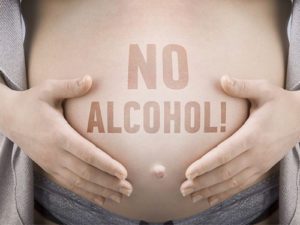
Prohibited to consume alcoholic beverages pregnantly
Recently several scientific studies have been carried out, which have been published in several specialized journals, that show the action of alcohol, even in small doses on the fetus. The fetal alcohol syndrome, that is, the involvement of the fetus by alcohol, may occur without necessary consuming large amounts of this product.
Theoretically, any drug consumed by the mother can cross the placental barrier, and penetrate fetal circulation. And maybe alcohol is one of the drugs that make this process easier. Once in the bloodstream of the fetus, alcohol is very easily distributed throughout its tissues, due to its high proportion of water, also appearing in the amniotic fluid. In addition, alcohol tends to stay longer in the fetus than in the mother, since the fetal elimination and detoxification systems, are very immature or simply do not exist. The liver cells of the fetus contain a smaller amount of enzymes than those of the adult. Thus, for example, alcohol dehydrogenase, an enzyme that degrades alcohol in other substances that can be eliminated, does not reach levels comparable to those of adults.
Why is alcohol dangerous?

Alcohol in the blood of the mother passes to the baby through the umbilical cord. Drinking alcohol during pregnancy can cause miscarriage, fetal death and a variety of physical, intellectual and behavioral disabilities for a lifetime. These disabilities are known as fetal alcohol spectrum disorders (FASD). Children with FASD can have the following characteristics or behaviors:
-Abnormal facial features such as a less marked groove between the nose and the upper lip.
-Head of small size.
-Height is shorter than average height.
-Low body weight
-Bad coordination
-Hyperactive behavior
-Difficulty paying attention.
-Bad memory.
-Difficulties in school (especially in mathematics).
-Learning disabilities.
-Delays in speech and language.
-Intellectual disability or low intellectual coefficient.
-Deficient reasoning and judgment capacity.
-Suction problems and sleeping difficulties in babies.
-Hearing and vision problems.
-Problems of the heart, kidneys or bones.

There is no period during pregnancy where you can drink without risk. Alcohol can cause problems for the pregnant baby at any stage of pregnancy, even before the woman knows she is pregnant. The consumption of alcohol in the first three months of pregnancy can cause abnormal facial features in the baby, central nervous system problems (eg, low birth weight, behavioral problems) may also occur. The baby’s brain is developing throughout the pregnancy and can be affected by alcohol exposure at any time.
Any kind of drink
It is often thought that fermented beverages, such as beer or wine, are less harmful than distilled beverages. There are pregnant women who drink wine, beer, whiskey or rum, thinking there is no real danger, but this is simply not true, there is not a threshold of safe consumption to prevent alcohol-fetal disorders, small doses can cause slight dysfunctions and their severity will increase in proportion to the amount of alcohol taken.
And the precautions do not end there, after giving birth, it is necessary to put the same care during breastfeeding, forgetting completely the consumption of alcohol because “it passes immediately to breast milk and, through it, to the newborn.

5 things you should know about alcohol consumption during pregnancy
Alcohol consumption during pregnancy can cause birth defects and disabilities in the baby. These conditions, known as fetal alcohol spectrum disorders (FASDs), are among the leading preventable causes of birth defects and developmental disabilities. Causing birth defects in the heart, brain, and other important organs. These problems last a lifetime.
No amount of alcohol that the mother can take during pregnancy is permissible without being a risk. All drinks that contain alcohol can affect the unborn baby. A 12-ounce can of beer has the same amount of alcohol as a 5-ounce glass of wine or 1 ounce of hard liquor.
In spite of all this information…
There are still many women who drink alcohol during pregnancy. In Costa Rica, approximately 1 in 8 pregnant women report having consumed some alcohol in the past 30 days; and approximately 1 in 50 pregnant women report having taken too much alcohol during the past 30 days (five or more drinks on the same occasion).
How to prevent anxiety about alcoholic beverages

When a pregnant woman feels an urge to consume an alcoholic beverage, experts recommend entertaining the mind with different activities such as exercise, yoga, and meditation, which are very beneficial for abstention and at the same time for childbirth. In addition, you can consume any food of your choice, such as fruits, vegetables and, in moderate quantities, sweets.
If you are pregnant or trying to get pregnant and can not stop drinking alcohol, seek help! Contact your health care provider, your local Alcoholics Anonymous center or a local alcohol treatment center, you will not regret it.

